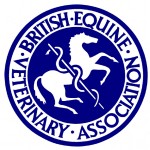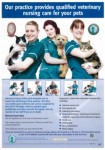During the Summer of 2011, having graduated from Middlesex University/The College of Animal Welfare, with a BSc (Hons) in Veterinary Nursing, Sarah Williams spent time as a volunteer in Mpumalanga fulfilling an ambition of working with the African wildlife…
I have always wanted to experience wildlife care in Africa so I organised a trip to ‘Care for Wild Africa’, a conservation unit in Nelspruit, Mpumalanga through African Conservation Experience. This company had been recommended to me by many people, and the Care for Wild seemed like a perfect project for me. I went to the centre shortly after graduating from my veterinary nursing degree, throughout which I had saved for such a trip.
Care for Wild Africa provided me with an experience of a life time, a rehabilitation unit for wild animals brought from far and wide to be cared for by Petronel Nieuwoudt and her team (including volunteers from all other the world). The centre was full of waifs and strays that could not be returned to the wild including a crane with a broken wing and a crow that could talk! However, the majority of animals were on their first step to be rehabilitated back to the wild.
Care for Wild’s aim was to rear animals from the bottle onto solids, in addition to treating any sick or injured animals brought to the centre by the local vets and game reserves. Once onto solids they would be moved to a second rehabilitation centre, where any imprinting caused by hand rearing would be eliminated and the wildlife would be taught to survive.
 After an early start, myself and two other volunteers were thrown into the deep end and placed in charge of five lions cubs, two genets, three caracals and two servals, all carnivores of Africa. The lion cubs were burdened with ringworm and parasites, and all had to be given a microcidal tablet and have anti-fungal creams and strong anti-fungal solutions applied daily. The youngest cub, Sam required a weekly injection. The stress all wild animals endure when hand reared in a conservation unit causes a degree of immuosupression, leading to the outbreak of normally controlled diseases and infections. Sam was also in a pride of older lions, therefore was exposed to a higher degree of stress, although their quality of lives were far greater than they had been at their previous homes and the stress caused during captivity was worthwhile compared to the freedom they would one day experience. Due to my previous experience, I had the task of administering these medications, each day was a struggle as the lions were becoming bigger and stronger, however we succeeded (mostly by bribing with meat) and by the end of my placement at Care For Wild there was hair growing on their shrinking lesions.
After an early start, myself and two other volunteers were thrown into the deep end and placed in charge of five lions cubs, two genets, three caracals and two servals, all carnivores of Africa. The lion cubs were burdened with ringworm and parasites, and all had to be given a microcidal tablet and have anti-fungal creams and strong anti-fungal solutions applied daily. The youngest cub, Sam required a weekly injection. The stress all wild animals endure when hand reared in a conservation unit causes a degree of immuosupression, leading to the outbreak of normally controlled diseases and infections. Sam was also in a pride of older lions, therefore was exposed to a higher degree of stress, although their quality of lives were far greater than they had been at their previous homes and the stress caused during captivity was worthwhile compared to the freedom they would one day experience. Due to my previous experience, I had the task of administering these medications, each day was a struggle as the lions were becoming bigger and stronger, however we succeeded (mostly by bribing with meat) and by the end of my placement at Care For Wild there was hair growing on their shrinking lesions.
We were given the weekends off to recuperate; although we were still responsible for the care of the wildlife, we did not have any extra duties or tova hour, which usually consisted of creating fire breaks in the bush, manual labour around the farm or maintenance of the enclosures. Instead, we went for bush walks or rested by the swimming pool. However, on my second Saturday there, a call came in from a local vet, asking if Petronel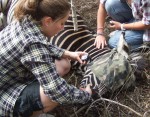 and the volunteers would like to assist in removing a snare from a zebras foot on a local game reserve. The zebras spoors had been tracked the day before and had been located that morning, we all travelled down and met the vets prior to the zebra being darted. The zebra had fallen on top of a tree stump and could have injured herself as she woke, therefore me moved her to a safer area and placed a blindfold. Luckily the snare had not caused too much damage and, whilst I monitored her heart and respiratory rate, she was given first aid treatment (mainly administered by the volunteers under the vets guidance), including removal of the snare, an antibiotic injection and an antiseptic solution spray. Her sedation was then reversed and we retreated to a safe distance, she was up within seconds and trotted off to find her herd and presumably her foal as she was lactating.
and the volunteers would like to assist in removing a snare from a zebras foot on a local game reserve. The zebras spoors had been tracked the day before and had been located that morning, we all travelled down and met the vets prior to the zebra being darted. The zebra had fallen on top of a tree stump and could have injured herself as she woke, therefore me moved her to a safer area and placed a blindfold. Luckily the snare had not caused too much damage and, whilst I monitored her heart and respiratory rate, she was given first aid treatment (mainly administered by the volunteers under the vets guidance), including removal of the snare, an antibiotic injection and an antiseptic solution spray. Her sedation was then reversed and we retreated to a safe distance, she was up within seconds and trotted off to find her herd and presumably her foal as she was lactating.
Again, due to Petronel’s high regard within South African wildlife rehabilitation we were invited to join a research project on roundworm in crocodiles. Crocodile meat is a substantial portion of the meat industry for Africa, however many had contracted Trichinella papuae (round worm) which caused no clinical signs to the crocodiles but could prove fatal to humans if eaten. Therefore a study was being conducted in which fifteen crocodiles had been administered a low dose of Trichinella, fifteen a medium and fifteen a large. We were allowed to assist in the administering of Trichinella infected meat via a gastric tube to the high concentration group and take blood from the medium and low groups. The blood taken was analysed by the research leader.
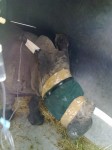 We also spent an amazing day in Kruger National Park with Mark (Petronel’s right hand man) and ex-Kruger guide and were lucky enough to see giraffe, many species of antelope, crocodiles, hippopotami, a leopard and four of the big five, we did not however see rhino. Ironically as we returned for Care a local vet was waiting for us with a 6 month old Rhino, DiDi, whose mother had been killed by a poacher. She was incredibly weak as had been running around the bush, yet still required a sedation to allow the vet to place a catheter in both ears, one attached to a litre of Hartmann’s the other a glucose solution (whichever percentage we had to hand!). She required 30 litres every 24 hours. On the top of the mountain in the middle of south Africa there were no drip pumps, burettes or even heparin/saline flush, therefore we had to check the drip frequently, change it every few hours (even through the night) and pray that DiDi remained calm enough to keep the drips tapped in. We placed antibiotics and vitamins into her drip bags. She was blindfolded to protect her eyes, however the vet was still worried about her injuring her eyes in the crate, for example hay or straw causing irritation, I therefore suggested and implemented donut bandages around her eyes, something I learnt during training (which worked very well)! That night began South Africa’s rainy season, during the biggest thunderstorm I ever wish to see she pulled one drip out. The other remained in place for three days, with the help of regular flushing, lots of duct tape and massaging the ear to remove any clots, whilst also dodging her six inch horn as she rammed the side of the crate.
We also spent an amazing day in Kruger National Park with Mark (Petronel’s right hand man) and ex-Kruger guide and were lucky enough to see giraffe, many species of antelope, crocodiles, hippopotami, a leopard and four of the big five, we did not however see rhino. Ironically as we returned for Care a local vet was waiting for us with a 6 month old Rhino, DiDi, whose mother had been killed by a poacher. She was incredibly weak as had been running around the bush, yet still required a sedation to allow the vet to place a catheter in both ears, one attached to a litre of Hartmann’s the other a glucose solution (whichever percentage we had to hand!). She required 30 litres every 24 hours. On the top of the mountain in the middle of south Africa there were no drip pumps, burettes or even heparin/saline flush, therefore we had to check the drip frequently, change it every few hours (even through the night) and pray that DiDi remained calm enough to keep the drips tapped in. We placed antibiotics and vitamins into her drip bags. She was blindfolded to protect her eyes, however the vet was still worried about her injuring her eyes in the crate, for example hay or straw causing irritation, I therefore suggested and implemented donut bandages around her eyes, something I learnt during training (which worked very well)! That night began South Africa’s rainy season, during the biggest thunderstorm I ever wish to see she pulled one drip out. The other remained in place for three days, with the help of regular flushing, lots of duct tape and massaging the ear to remove any clots, whilst also dodging her six inch horn as she rammed the side of the crate.
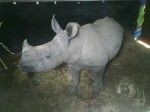 During these three days the team also had to divide the Boma into two, to separate the two other baby Rhinos at the centre from DiDi. Luna and Storm were also being hand reared however, they were several months younger and would have been injured by DiDi if introduced. On the third day DiDi was sedated and walked to the new enclosure using various ropes to guide her and prevent her charging at anyone. Once into her new shelter we monitored her for three hours, ensuring she did not drown in her water (which was left in as she was still very much wild and would therefore been to too dangerous to place later) or injure herself during her recovery. She was still very weak and had severe muscle wastage, she had also been blindfolded for the three days whilst in the crate and therefore took time to adjust to a low level of light.
During these three days the team also had to divide the Boma into two, to separate the two other baby Rhinos at the centre from DiDi. Luna and Storm were also being hand reared however, they were several months younger and would have been injured by DiDi if introduced. On the third day DiDi was sedated and walked to the new enclosure using various ropes to guide her and prevent her charging at anyone. Once into her new shelter we monitored her for three hours, ensuring she did not drown in her water (which was left in as she was still very much wild and would therefore been to too dangerous to place later) or injure herself during her recovery. She was still very weak and had severe muscle wastage, she had also been blindfolded for the three days whilst in the crate and therefore took time to adjust to a low level of light.
Luna and Storm were being hand reared at the centre on behalf of their ‘owners’ (who own the land they live on). A sub team was created, including myself, to care for the three Rhinos as they are incredibly sensitive to smells of new people and also infections from carnivores such as big cats. I was therefore taken off of the lions and had limited contact with them for the last week, changing clothes and disinfecting my hands and shoes if I had touched them.
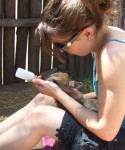 During my three weeks I was also involved in the care of various types of antelope. I assisted in feeding a duiker (every three hours) and was allowed to give an intra muscular sedative injection to a red heart beast antelope named ‘Ferrari’. She would not allow us to bottle feed her and therefore I administered a mild sedation to keep her calm, this worked incredibly well and she allowed us to feed her from then on without sedation.
During my three weeks I was also involved in the care of various types of antelope. I assisted in feeding a duiker (every three hours) and was allowed to give an intra muscular sedative injection to a red heart beast antelope named ‘Ferrari’. She would not allow us to bottle feed her and therefore I administered a mild sedation to keep her calm, this worked incredibly well and she allowed us to feed her from then on without sedation.
The centre was a mix of hard work and incredible experiences. During my time there we also practiced shooting dart guns, went on microflights to spot wildlife, took part in team building activities, had many Braai’s, appeared on South African television, radio and newspapers and learnt a vast amount of information surrounding the care of wildlife; both healthy, unhealthy, young and old. We were also taught some very important life lessons and faced difficult tasks varying from cutting meat from calf bones for the lions to seeing the hardship of many African’s lives just to survive, which often caused the poaching that lead so many orphaned animals to Care for Wild. I would love to return to Africa again to work with the wildlife, however time and money may not allow this for a few years and I do not believe I will ever be able to replicate the amazing time I had! I gained so much knowledge and experience that I can apply to my small animal practice, whilst also boosting my confidence in my own nursing skills. It was amazing to be a very small part in helping African wildlife return to their natural habitat.
To find out how you can make a difference as a conservation volunteer click here
